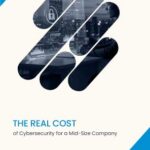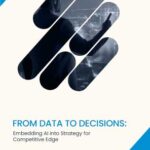or call: +1 (845) 347-8894

or call: +1 (845) 347-8894

In 2025, B2B organizations aren’t just looking to train their teams. They’re seeking a strategic edge. As industries shift and clients demand deeper technical fluency, the question isn’t whether training should be improved. It’s whether learning itself can become a competitive advantage.
Artificial Intelligence (AI) is transforming this conversation. With AI-enhanced corporate learning platforms, B2B organizations are no longer just investing in employee development. They’re investing in scalable systems that can mirror market shifts, drive faster decision-making, and preemptively build skills aligned to client needs.
This is no longer about HR optimization. It’s about strategic enablement.
Most organizations still see corporate learning as a cost center. AI-enhanced platforms challenge this view by enabling continuous skill benchmarking against real-time market trends. These platforms don’t simply teach. They collect data on emerging competencies, uncover skill gaps by role or geography, and help organizations project future workforce capabilities.
Imagine a cloud services company using its learning platform to track which sales engineers are mastering Kubernetes faster, or which global teams are lagging in generative AI adoption. Those aren’t just learning insights. They’re signals about future project readiness, client risk, and competitive advantage. In this way, AI-enhanced platforms start to function like a business intelligence tool focused on internal capability alignment.
Generic e-learning modules don’t cut it in high-complexity B2B environments. AI-enhanced platforms can train differently for the nuanced demands of industries like fintech, industrial IoT, or advanced manufacturing. They dynamically adapt learning paths based on sector-specific compliance, client onboarding procedures, and evolving technical standards.
For instance, a cybersecurity firm can set up a rules engine that instantly updates training modules in response to new regulatory frameworks or zero-day threats. This adaptability makes AI-enhanced learning systems not only scalable but also context-aware. They align workforce skills with sector shifts faster than traditional methods. It’s not just learning at scale. It’s learning with relevance at scale.
In many B2B organizations, there’s a critical disconnect between what product teams are building and what frontline teams understand. As solutions grow more complex, think AI infrastructure, multi-cloud environments, or API ecosystems, training becomes a bottleneck for effective sales and implementation.
AI-enhanced platforms help bridge this gap by translating product changes into tailored microlearning for each internal stakeholder group. Account executives can receive simplified use-case training, while solutions architects access technical walkthroughs, all triggered automatically based on product release cycles. This ensures teams remain synchronized across functions, reducing internal friction and improving external client experience.
Hiring your way out of skill gaps is no longer sustainable. This proactive approach aligns with recent findings that 85% of professionals are planning to upskill in FY25, focusing on areas like AI, Machine Learning, and Data Science. As demand for AI engineers, data scientists, and cloud architects far outpaces supply, B2B organizations are forced to rethink how they grow talent internally.
AI-driven learning platforms provide visibility into who’s ready to reskill, who’s accelerating fastest, and who’s stagnating. Rather than waiting for roles to open or performance to dip, organizations can preemptively reallocate high-potential employees toward high-demand roles using learning behavior signals as indicators of readiness. This shifts talent planning from reactive to predictive, making your current workforce your most valuable future asset.
While most discussions around AI learning platforms focus internally, forward-looking B2B companies are extending this infrastructure to clients. Enterprise software vendors, for example, are offering AI-personalized onboarding platforms to help customers upskill their teams faster.
This becomes a value-added service and in some cases, a paid subscription tier. More importantly, it reduces time-to-value for clients, increases platform stickiness, and decreases churn. By investing in AI-enhanced learning, B2B organizations not only elevate their workforce. They improve client outcomes in measurable, monetizable ways.
B2B markets can shift dramatically. Regulatory mandates, supply chain disruptions, and geopolitical tensions often demand rapid skill pivots. In such scenarios, organizations with static training models falter. Those with AI-enhanced learning systems can redeploy skills in real time.
For instance, a logistics company reacting to international trade restrictions can trigger immediate training modules on new customs procedures, safety protocols, or compliance rules. These modules adapt per region, language, and function without centralized HR needing to manually rebuild learning paths.This flexibility gives organizations the confidence to respond to disruption with agility instead of paralysis.
Traditionally, boardrooms focus on revenue, margin, and risk. But as knowledge becomes currency, learning metrics are gaining strategic relevance. AI-enhanced platforms deliver analytics not just on completion rates or test scores, but on workforce adaptability, projected upskilling timelines, and alignment to strategic initiatives.
For example, if a B2B firm’s five-year vision depends on mastering AI/ML services, the learning platform can model the actual skill-readiness trajectory of the workforce. This makes training data a board-level metric, turning learning into a dashboard of strategic preparedness.
Finally, the role of learning in company culture can’t be overstated. AI-enhanced platforms support just-in-time learning, social collaboration, and gamification, encouraging employees to engage with content proactively, not just reactively.
This helps foster a culture of experimentation. Developers can explore emerging technologies without waiting for a course. Sales teams can simulate new verticals on demand. Leaders can digest market strategy modules ahead of major shifts. The result is a self-directed, innovation-focused workforce, critical for B2B companies aiming to lead rather than follow.
While efficiency gains and cost reductions are common selling points for AI-enhanced corporate learning platforms, they miss the broader strategic picture. In B2B, the real value lies in how these platforms drive market readiness, client confidence, and innovation velocity.
They don’t just teach people faster. They align talent to strategy faster. As global competition accelerates and skills decay at unprecedented rates, the organizations that thrive will be those that treat learning not as a function but as a force multiplier.
An AI-enhanced corporate learning platform is a digital training system that uses artificial intelligence to personalize learning paths, track skill development, and adapt content in real time based on user behavior, industry trends, and organizational goals. These platforms go beyond traditional e-learning by offering smart automation and data-driven insights for strategic workforce development.
B2B organizations face rapid technological changes and complex client demands. AI-enabled learning platforms help these organizations stay competitive by accelerating employee upskilling, aligning talent with market needs, and enhancing cross-functional collaboration. They transform learning into a business strategy rather than a routine HR function.
AI algorithms analyze learner behavior, job roles, and performance data to tailor course recommendations, delivery formats, and pacing. It enables adaptive learning paths that are unique to each employee, ensuring more relevant and efficient training across departments and geographies.
Yes. AI-enhanced platforms can be configured with industry-specific content, compliance modules, and workflows. This ensures that employees in highly regulated or fast-changing sectors receive training that’s timely, relevant, and compliant with evolving standards.
They reduce the gap between product updates and frontline knowledge by delivering real-time training to sales and technical teams. This helps improve client onboarding, shorten sales cycles, and enhance team readiness for complex product discussions.
To participate in our interviews, please write to our IntentTech Media Room at sudipto@intentamplify.com




